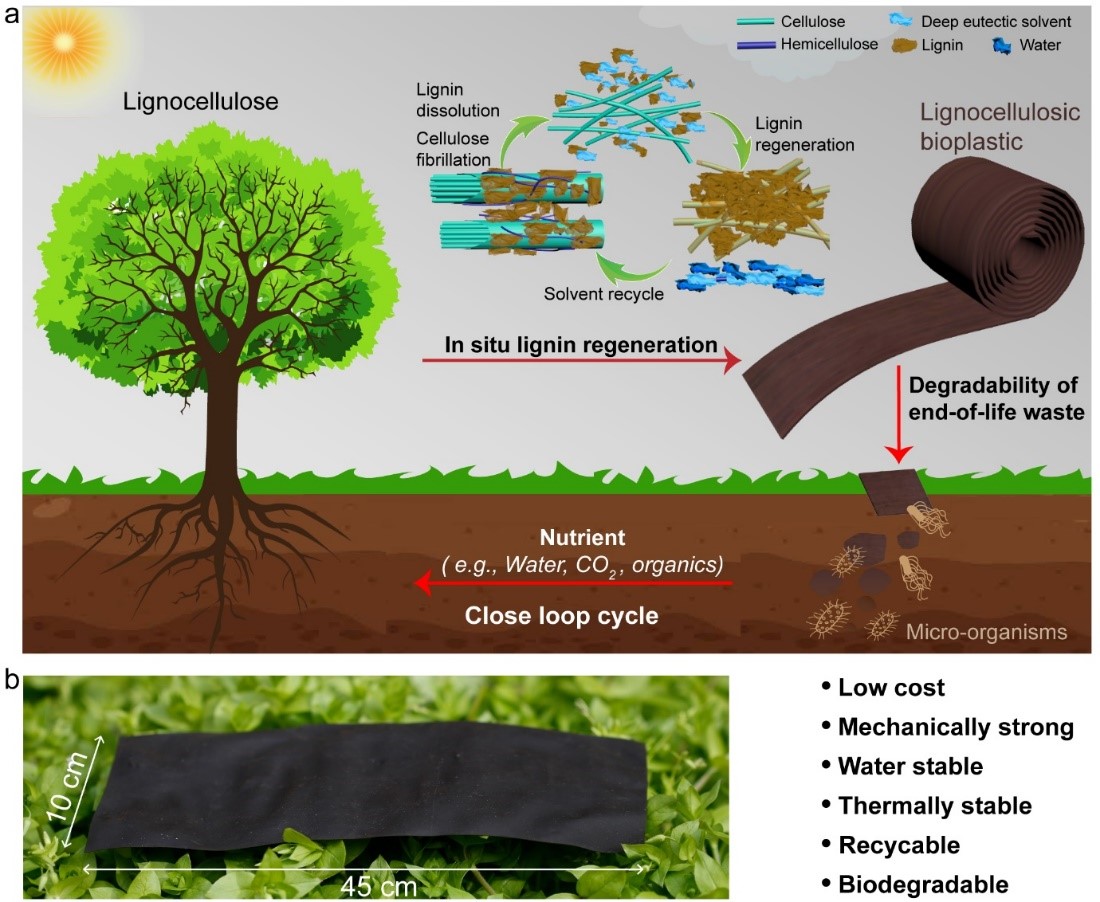Press Release
Plastic Alternative Made 100% of Wood
Study on strong, biodegradable and recyclable bioplastic published in Nature Sustainability.
FOR IMMEDIATE RELEASE March 25, 2021
CONTACT:
Katie Doyle
301 405 0379
khollan3@umd.edu

The preparation of high-performance lignocellulosic bioplastic and its degradation, resulting in a close loop cycle. Credit: Qinqin Xia for the University of Maryland, College Park.
More than 380 million tons of plastic are produced each year, far surpassing most other man-made materials. It can take thousands of years for plastics to degrade due to the stable long polymer chains. Roughly 12 million metric tons of plastic waste will be in landfills, or in natural environment by 2050,causing severe environmental pollution (i.e., 'white pollution'). More seriously, large numbers of plastic are slowly degraded and then converted into millions of microplastic pieces (millimeters or smaller in size) in the oceans and soil, posing a significant threat to numerous organisms.
In the interest of decreasing this threat, a University of Maryland (UMD) research team led by Liangbing Hu -- a Herbert Rabin Distinguished Professor in the UMD Department of Materials Science and Engineering (MSE) and the founding director of Center for Materials Innovation (CMI) -- recently developed a simple yet cost-effective in-situ lignin regeneration approach to synthesize a strong, large-scale, hydrostable, biodegradable and recyclable lignocellulosic bioplastic, produced 100% from an abundant and inexpensive wood powder, which is generally discarded as waste. The study, entitled, "A strong, biodegradable and recyclable lignocellulosic bioplastic," was published in Nature Sustainability on March 25.
In the fabrication process, the porous structure of natural wood is deconstructed to form a homogeneous cellulose-lignin 'soup' that features nanoscale entanglement and hydrogen bonding between the regenerated lignin and cellulose micro/nanofibrils. Large-scale lignocellulosic bioplastic films can then be fabricated by simply casting the cellulose-lignin soup into a mold. Unlike most petrochemical plastics, this bioplastic can be broken down by microorganisms in soil, which offers an attractive closed loop cycle feature (see Figure). Additionally, the material is strong and robust, demonstrating a unique balance between degradability and durability, which neither conventional plastics nor hydrophilic cellulose consumer products can provide.
"We also noted the lignocellulosic bioplastic can be made from various biomass feedstocks, such as grass, wheat straw and bagasse, suggesting the broad applicability of the treatment process," said Hu. "This strong, water-stable, biodegradable and recyclable lignocellulosic bioplastic with a substantially reduced environmental waste footprint is a strong candidate for replacing widely used petrochemical plastics toward sustainable applications."
This study was a collaborative effort between scientists at UMD, University of Wisconsin-Madison, Yale University and the Center for Materials Innovation.
For additional information: Xia, Q., Chen, C., Yao, Y., Li, J., He, S., Zhou, Y., Li, T., Pan, X., Yao, Y., and Hu, L. (March 2021). "A Strong, Biodegradable and Recyclable Lignocellulosic Bioplastic." Nature Sustainability, DOI: 10.1038/s41893-021-00702-w
About the A. James Clark School of Engineering
The University of Maryland’s A. James Clark School of Engineering is a premier program, ranked among the top 20 in the world. Located just a few miles from Washington, D.C., the Clark School is at the center of a constellation of high-tech companies and federal laboratories, offering students and faculty access to unique professional opportunities.
Our broad spectrum of academic programs, including the world’s only accredited undergraduate fire protection engineering program, is complemented by a vibrant entrepreneurial ecosystem, early hands-on educational experiences, and participation in national and international competitions.
The Clark School is leading research advancements in aerospace, bioengineering, robotics, nanotechnology, disaster resilience, energy and sustainability, and cybersecurity. From the universal product code to satellite radio, SMS text messaging to the implantable insulin pump, our students, faculty, and alumni are engineering life-changing innovations for millions. Learn more at www.eng.umd.edu.